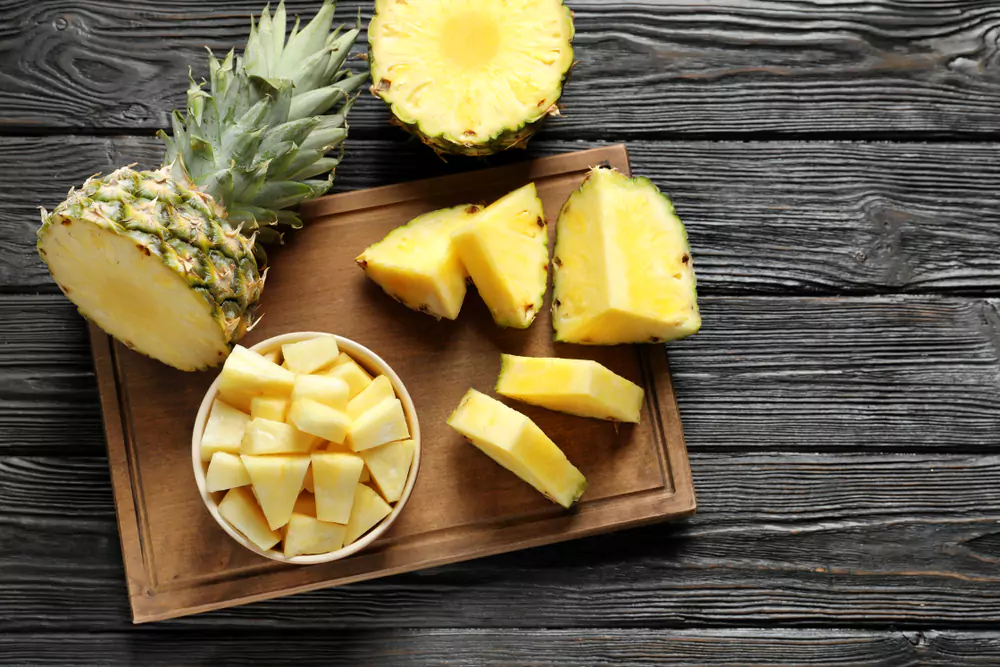Are you following a ketogenic diet and wondering if pineapples can be included in your meal plan? In this article, we will delve into the question, “Is Pineapple Keto Friendly?” and provide a detailed analysis of whether or not pineapples can fit into a keto lifestyle.
We will explore the nutritional composition of pineapples and their impact on ketosis and offer some tips on incorporating them into your ketogenic diet. So, let’s discover if pineapples can be a part of your keto journey!
What Is The Keto Diet?

The keto diet is a low-carb, high-fat diet that aims to put your body into a state of ketosis, where it burns fat for energy instead of carbohydrates. When you drastically reduce your carbohydrate intake and increase your fat intake, your body will enter a metabolic state called ketosis, which will begin to break down stored fat for energy. This can lead to weight loss, improved blood sugar control, and increased energy levels.
Benefits Of the Ketogenic Diet
Here are some of the potential benefits associated with the ketogenic diet:
Weight Loss
One of the primary reasons people adopt the ketogenic diet is for weight loss. The body enters a metabolic state called ketosis by restricting carbohydrate intake and increasing fat consumption. In this state, the body uses stored fat as its primary energy source, leading to weight loss. Additionally, the keto diet helps control hunger hormones and promotes satiety, which can further aid in weight management.
Improved Blood Sugar Control
The ketogenic diet has shown promising results in improving blood sugar control, especially for individuals with type 2 diabetes or insulin resistance. Reducing carbohydrate intake decreases the body’s need for insulin, leading to stabilized blood sugar levels. This can be particularly beneficial for managing diabetes and reducing the risk of complications associated with high blood sugar.
Increased Energy Levels
Following a ketogenic diet makes the body efficient at burning fat for fuel. Fat is a more stable and sustainable energy source than carbohydrates, which can cause energy spikes and crashes. Many individuals on the keto diet report increased energy levels and improved mental clarity throughout the day.
Reduced Inflammation
Chronic inflammation is linked to various health conditions, such as heart disease, diabetes, and certain types of cancer. The ketogenic diet has been shown to reduce inflammation markers in the body due to its emphasis on whole foods and healthy fats. By reducing inflammation, individuals may experience improvements in overall health and a decreased risk of chronic diseases.
Enhanced Brain Function
The brain requires a constant supply of energy to function optimally. While glucose is the brain’s primary fuel source, it can also utilize ketones produced during ketosis. Some studies suggest that the ketogenic diet may improve cognitive function, memory, and focus. It has also shown potential benefits for individuals with neurological disorders such as epilepsy, Alzheimer’s disease, and Parkinson’s disease.
Is Pineapple Keto Friendly? No But Why?

Pineapples can be consumed in moderation on a keto diet. While they are relatively high in carbohydrates, they contain essential nutrients and fiber. One cup of pineapple chunks contains about 21 grams of net carbs, which can be significant for those following a strict keto diet.
However, pineapples can still be enjoyed occasionally if consumed in small portions and incorporated into a well-balanced meal plan that is low in overall carbs. It is essential to consider individual dietary needs and goals when determining whether pineapples fit into a keto-friendly diet.
Carbohydrates Are In Pineapples
Pineapples contain carbohydrates. Carbohydrates, along with proteins and fats, are one of the three main macronutrients found in food. They are a crucial energy source for the body and play a vital role in various physiological processes. Like many other fruits, pineapples contain carbohydrates in the form of sugars, primarily fructose.
These sugars provide sweetness to the fruit and contribute to its overall carbohydrate content. However, it is essential to note that pineapples contain other beneficial nutrients such as vitamins, minerals, and dietary fiber, making them a nutritious addition to a balanced diet.
Are Pineapples High In Sugar?
Yes, pineapples are relatively high in sugar compared to other fruits. They contain natural sugars, primarily fructose, contributing to their sweet taste. However, it is essential to note that the sugar content in pineapples is still moderate compared to processed foods and sugary beverages.
Additionally, pineapples offer various health benefits due to their rich nutrient profile, including vitamins, minerals, and antioxidants. Therefore, consuming pineapples in moderation as part of a balanced diet can be a healthy choice.
Do Pineapples Contain Fiber?
Yes, pineapples contain fiber. Fiber is a carbohydrate that the human body cannot digest. It passes through the digestive system relatively intact, providing various health benefits. Pineapples are a good source of dietary fiber, with approximately 2.3 grams of fiber per cup (165 grams) of pineapple chunks.
Fiber is crucial in maintaining healthy digestion, promoting regular bowel movements, and preventing constipation. Additionally, it can help control blood sugar levels, lower cholesterol levels, and contribute to weight management. Including pineapples in your diet can be a tasty way to increase your fiber intake.
Are There Any Vitamins And Minerals In Pineapples?
Yes, pineapples are a rich source of various vitamins and minerals. They contain significant amounts of vitamin C, manganese, and vitamin B6. Vitamin C is an essential nutrient crucial in boosting the immune system, promoting collagen production, and acting as an antioxidant.
Manganese is essential for bone health, metabolism, and antioxidant defense. Vitamin B6 is involved in brain development and function and the production of neurotransmitters. Pineapples also provide smaller amounts of other vitamins and minerals like thiamine, riboflavin, folate, potassium, magnesium, and iron.
What Is The Glycemic Index Of Pineapples?

Pineapples’ glycemic index (GI) is relatively low, ranging from 46 to 66. The GI measures how quickly a carbohydrate-containing food raises blood sugar levels. Pineapples have a moderate GI due to their natural sugars and fiber content.
However, pineapples’ glycemic load (GL) is considered low, as the GL thinks both the GI and the amount of carbohydrates consumed. Pineapples are also rich in vitamins, minerals, and antioxidants, making them a healthy addition to a balanced diet.
Can Consuming Pineapples Affect Ketosis?
No, consuming pineapples does not affect ketosis. Pineapples are relatively low in carbohydrates and high in fiber, making them a suitable fruit to include in a ketogenic diet. While they contain natural sugars, the overall carbohydrate content of pineapples is moderate and can be easily incorporated into a well-balanced ketogenic meal plan.
However, it is essential to consume pineapples in moderation and account for their carbohydrate content within the daily carbohydrate limit for maintaining ketosis.
Pineapple Comparison To Other Fruits In Terms Of Their Keto-Friendliness
Pineapple is relatively high in carbohydrates compared to other fruits, making it less keto-friendly. A 100-gram serving of pineapple contains around 13 grams of net carbs, which can significantly impact ketosis for individuals following a ketogenic diet.
In contrast, fruits such as berries (e.g., strawberries, raspberries, and blackberries) are more keto-friendly due to their lower carbohydrate content.
For instance, a 100-gram serving of strawberries contains approximately 6 grams of net carbs. While pineapple does offer various health benefits and nutrients like vitamin C and manganese, individuals on a strict ketogenic diet may opt for lower-carb fruits to maintain ketosis.
Potential Health Benefits Of Consuming Pineapples On A Ketogenic Diet
Pineapples can provide several potential health benefits when consumed as a ketogenic diet. While the ketogenic diet typically restricts carbohydrate intake, pineapples can still be enjoyed in moderation due to their unique nutritional profile.
Here are some potential health benefits of consuming pineapples on a ketogenic diet:
Rich in nutrients
Pineapples are packed with essential vitamins and minerals. They are an excellent vitamin C source, critical for immune function, collagen synthesis, and antioxidant protection. Pineapples also contain manganese, which plays a role in energy metabolism and antioxidant defense.
Digestive support
Pineapples contain bromelain, a mixture of enzymes that aid in digestion. Bromelain has been shown to help break down proteins and improve the absorption of nutrients. This can be particularly beneficial for individuals following a high-fat ketogenic diet, as it may support optimal digestion and nutrient utilization.
Anti-inflammatory properties
Bromelain found in pineapples has been associated with anti-inflammatory effects. Chronic inflammation contributes to various health conditions, including obesity, diabetes, and cardiovascular disease. By incorporating pineapples into a ketogenic diet, individuals may benefit from bromelain’s anti-inflammatory properties.
Hydration
Pineapples have a high water content, which can contribute to hydration. Staying hydrated is crucial for overall health and well-being, especially when following a ketogenic diet that can have diuretic effects due to lower carbohydrate intake.
Antioxidant protection
Pineapples contain various antioxidants, including vitamin C and beta-carotene. These antioxidants help neutralize harmful free radicals in the body, reducing oxidative stress and protecting against cellular damage. Incorporating pineapples into a ketogenic diet can contribute to overall antioxidant protection.
Alternative Low-Carb Fruits Suitable For The Keto Diet
The ketogenic, or keto, is a low-carb, high-fat diet that has gained popularity for its potential health benefits and weight loss effects. While the diet primarily focuses on consuming foods low in carbohydrates, it is essential to note that not all fruits are suitable for the keto diet due to their higher sugar content.
However, several alternative low-carb fruits can be enjoyed while following a keto lifestyle.
Avocado
Avocados are often considered a superfood due to their high nutrient content and healthy fat profile. They are low in carbohydrates and high in monounsaturated fats, which makes them an excellent choice for the keto diet. Avocados also provide essential vitamins and minerals such as potassium, K, E, and C.
Berries
Berries such as strawberries, raspberries, blackberries, and blueberries are relatively lower in carbohydrates than other fruits. They are packed with antioxidants, fiber, and various vitamins and minerals. Berries on the keto diet can be enjoyed in moderation as they provide a sweet taste without significantly impacting blood sugar levels.
Coconut
Coconuts and coconut products like coconut oil and coconut milk are great options for those following a keto diet. They contain healthy fats called medium-chain triglycerides (MCTs), which the liver can easily convert into ketones for energy. Coconuts also offer fiber, vitamins, minerals, and electrolytes.
Lemons and Limes
Although lemons and limes are acidic fruits, they are considered low in carbohydrates and can be included in small amounts on the keto diet. They add a refreshing flavor to dishes and beverages without significantly affecting blood sugar levels.
Tomatoes
While technically classified as a fruit, tomatoes have a relatively low carbohydrate content compared to other fruits. They are rich in vitamins A and C and lycopene, an antioxidant known for its potential health benefits. Tomatoes can be enjoyed in moderation on the keto diet.
Conclusion
In conclusion, pineapples can be included in a keto diet, but they should be consumed in moderation due to their relatively high carbohydrate content. While pineapples are a good source of vitamins and minerals, they also contain natural sugars that can affect ketosis. It is essential to consider individual dietary goals and carbohydrate limits when incorporating pineapples into a keto meal plan. Consulting with a healthcare professional or registered dietitian is recommended for personalized advice.
FAQs
What Fruit Is Allowed On Keto?
In moderation, the fruits that are generally allowed on a ketogenic diet are berries such as strawberries, raspberries, and blackberries. These fruits are relatively low in carbohydrates and can be enjoyed as part of a well-balanced keto meal plan.
Is Pineapple A Low-Carb Food?
No, pineapple is not considered a low-carb food. It is relatively high in carbohydrates compared to other fruits. A cup of pineapple chunks contains around 22 grams of net carbs, which can significantly impact ketosis for those following a strict ketogenic diet.
What Fruits Are Off Limits On Keto?
While some fruits can be consumed in moderation on a ketogenic diet, certain fruits are generally off-limits due to their high carbohydrate content. T
Is Pineapple Peel Good For Keto?
Pineapple peel is not commonly consumed and needs specific nutritional information readily available. However, it is essential to note that the peel of any fruit generally contains higher concentrations of fiber and nutrients than the flesh.
Is Canned Pineapple Keto Friendly?
Canned pineapple typically contains added sugars or syrups, making it higher in carbohydrates than fresh pineapple. It is essential to check the nutrition label and ingredient list when considering canned pineapple for a keto diet.
Is Watermelon Keto Friendly?
Watermelon is relatively high in natural sugars and carbohydrates, making it less suitable for a strict ketogenic diet. A cup of diced watermelon contains around 11 grams of net carbs.
Is Mango Keto Friendly?
Mangoes are not considered keto-friendly due to their high sugar and carbohydrate content. A cup of diced mango contains approximately 25 grams of net carbs, which can significantly impact ketosis.
Is Grilled Pineapple Keto Friendly?
Grilling pineapple does not alter its carbohydrate content. Therefore, grilled pineapple remains relatively high in carbohydrates and is not considered keto-friendly.






